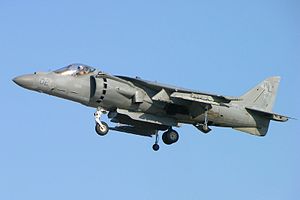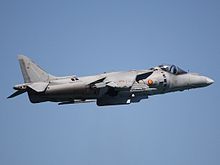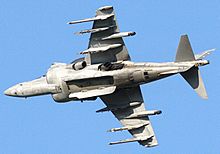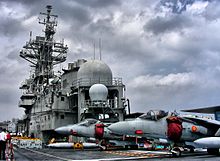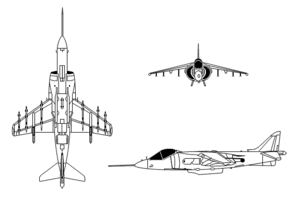- McDonnell Douglas AV-8B Harrier II
-
This article is about the American Harrier II models. For the British Harrier II models, see British Aerospace Harrier II. For the first generation Harrier, see Hawker Siddeley Harrier.
AV-8B Harrier II
EAV-8B Matador IIA United States Marine Corps AV-8B hovering Role V/STOL ground-attack aircraft National origin United States / United Kingdom Manufacturer McDonnell Douglas / British Aerospace
Boeing / BAE SystemsFirst flight YAV-8B: 9 November 1978[1]
AV-8B: 5 November 1981[2]Introduction August 1985[3] Status Active service Primary users United States Marine Corps
Spanish Navy
Italian NavyProduced 1981–2003[4] Program cost US$6.5 billion (1987)[5] Unit cost US$24–30 million[6] Developed from Hawker Siddeley Harrier Variants British Aerospace Harrier II The McDonnell Douglas (now Boeing) AV-8B Harrier II is a second-generation vertical/short takeoff and landing (V/STOL) ground-attack aircraft. An Anglo-American development of the British Hawker Siddeley Harrier, the Harrier II is the final member of the Harrier family that started with the Hawker Siddeley P.1127 in the early 1960s. The AV-8B is primarily used for light attack or multi-role missions, and is typically operated from small aircraft carriers, large amphibious assault ships and simple forward operating bases. The British Aerospace Harrier II variant of the AV-8B was developed for the British military. The AV-8B is used by the United States Marine Corps (USMC), Spanish Navy and Italian Navy. The TAV-8B is a dedicated two-seat trainer version. The Harrier II and other models of the Harrier family have been called "Jump Jets".
The AV-8B was extensively redesigned by McDonnell Douglas from the earlier AV-8A/C Harrier. It has a new wing, an elevated cockpit, a redesigned fuselage, and other structural and aerodynamic refinements. The number of hardpoints was increased from five to seven. Later upgrades, which resulted in the AV-8B(NA) and AV-8B Harrier II Plus, added radar and night-attack capabilities. British Aerospace joined the improved Harrier project in the early 1980s. Since mergers in the 1990s, Boeing and BAE Systems have jointly supported the program.
AV-8Bs have participated in numerous conflicts, providing close air support for ground troops and performing armed reconnaissance, proving themselves versatile assets. US Army General Norman Schwarzkopf named the USMC Harrier as one of the seven most important weapons of the Gulf War. The aircraft took part in combat in Iraq again during the Iraq War beginning in 2003. The Harrier II has served in Operation Enduring Freedom in Afghanistan since 2001, and was used in Operation Odyssey Dawn in Libya in 2011. Italian and Spanish Harrier IIs participated in overseas conflicts, in conjunction with NATO coalitions. American and Italian AV-8Bs are expected to be replaced by the Lockheed Martin F-35B Lightning II.
Contents
Development
Origins
In the late 1960s and early 1970s, as the first-generation Harriers entered service with the Royal Air Force (RAF) and United States Marine Corps (USMC), it became increasingly apparent that they were handicapped in range and payload, and in 1973 Hawker Siddeley and McDonnell Douglas began joint development of a more capable version of the Harrier. Early efforts concentrated on an improved Pegasus engine, designated Pegasus 15, which was undergoing testing by Bristol Siddeley.[7] The engine was more powerful but had a diameter 2.75 inches (70 mm) larger, too big to readily fit into the Harrier.[8]
A joint American and British team completed a document defining an Advanced Harrier with the Pegasus 15 engine in December 1973. The Advanced Harrier was intended to replace original RAF and USMC Harriers, as well as the latter's A-4s.[9][10] The Advanced Harrier was unofficially named "AV-16", with the aim of doubling the AV-8's payload and range capabilities. The British government pulled out of the project in March 1975 due to decreased defense funding, rising costs, and a small 60-aircraft order by the RAF.[7][9][11] The US was unwilling to fund development by itself, and ended the project later that year.[12]
The two companies took different paths toward an enhanced Harrier. Hawker Siddeley focused on a new larger wing that could be retrofitted to existing operational aircraft, while McDonnell Douglas independently undertook a less ambitious, though still expensive, project catering to the needs of the US military. Using knowledge gleaned from the AV-16 effort, though dropping some items—such as the larger Rolls-Royce Pegasus engine—McDonnell Douglas kept the baseline structure and engine for an aircraft tailored for the USMC.[7][13] The plan for Harrier II development was authorized by the US Department of Defense (DoD) in 1976.[14]
Designing and testing
A US Marine Corps AV-8B Harrier II demonstrating its hover capabilities.
In 1981, the DoD included the Harrier II in its annual budget and five-year defense plan, after attempts within the DoD and United States Navy (USN) to terminate the program between 1978 and 1980. The Navy declined to participate in the procurement, citing the limited range and payload compared with conventional aircraft.[15] The USMC planned to order 336 aircraft at that time.[16]
In August 1981, the program received a boost when British Aerospace (BAe) and McDonnell Douglas signed a Memorandum of Understanding (MoU), signaling the UK's re-entry into the program.[7] Under the agreement, BAe was relegated to the position of a subcontractor, instead of the full partner status that would have been the case had the UK not left the program. Consequently, the company received, in man-hours, 40% of the airframe work-share.[7] Aircraft production would occur at McDonnell Douglas' facilities in St. Louis, Missouri, and manufacturing by BAe would take place at their Kingston and Dunsfold facilities in Surrey, England.[17] Meanwhile, 75% work-share for the engine went to Rolls-Royce with the remaining 25% taken up by Pratt & Whitney. Rolls-Royce had previously absorbed Bristol Siddeley.[7]
The US Navy, which traditionally procures military aircraft for the Marines, insisted that the new design be verified with flight hardware. To do this, McDonnell Douglas modified two AV-8As with new wings, modified intakes, redesigned exhaust nozzles, and other aerodynamic refinements; the modified forward fuselage and cockpit were not incorporated.[18][19] Designated YAV-8B, the first converted aircraft flew on 9 November 1978, followed by the second on 19 February 1979; the second aircraft crashed in November due to engine flameout.[19] These modified AV-8s were flight-tested during 1978–1979.[20] Test results showed greater than expected drag, somewhat hampering the aircraft's maximum speed. Refinements to the aerodynamic profile yielded little improvement.[19] Positive results in other areas, including payload, range and V/STOL performance, led to the award of a development contract in 1979; the contract called for 12 aircraft in the first batch, and a further 324 thereafter.[2][21]
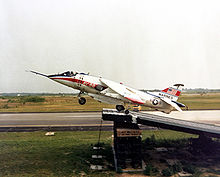 A YAV-8B Harrier II executing a ski jump takeoff at Naval Air Station Patuxent River. Having been converted from an AV-8A, this aircraft does not feature the raised cockpit found on AV-8Bs.
A YAV-8B Harrier II executing a ski jump takeoff at Naval Air Station Patuxent River. Having been converted from an AV-8A, this aircraft does not feature the raised cockpit found on AV-8Bs.
Four full-scale development (FSD) aircraft were constructed. The first of these (BuNo 161396), used mainly for testing performance and handling qualities, took its maiden flight on 5 November 1981. The second and third FSD aircraft, which introduced wing leading edge root extensions (LERX) to meet RAF requirements, as well as modifications to the engine intakes, first flew in April the following year, and the fourth in January 1984.[2] The first production AV-8B was delivered to the USMC's training squadron VMAT-203 at Marine Corps Air Station Cherry Point (MCAS Cherry Point) on 12 December 1983,[22] and officially handed over one month later.[23] The last of the initial batch of twelve was delivered in January 1985 to the front-line squadron VMA-331.[2][3] The engine used for these aircraft was the F402-RR-404A, with 21,450 lb (95.4 kN) of thrust; aircraft from 1990 onwards received upgraded engines.[2]
Further developments
During the initial pilot conversion course, it became apparent that the AV-8B exhibited different flight characteristics from the AV-8A, and that the use of a digital cockpit instead of the analog cockpit of the TAV-8A also necessitated additional training.[24] Consequently, in 1984, money for eight AV-8Bs was diverted to the development of a two-seat TAV-8B dedicated trainer. The first of the twenty-eight TAV-8Bs eventually procured had its maiden flight on 21 October 1986.[24][25][N 1] This aircraft was delivered to VMAT-203 on 24 July 1987.[26][24] The TAV-8B was also ordered by Italy and Spain.[25]
In 1985, McDonnell Douglas commenced work on a night-attack variant of the Harrier II; the company and BAe had been encouraged to continue development by export interest from Brazil, Japan and Italy.[27] The USMC ordered 66 AV-8B(NA)s.[28] The 87th production AV-8B therefore became the first Harrier II to be modified with equipment for night attacks, and rolled off the St. Louis production line in June 1987. Flight tests proved successful and the night attack capability was validated. In September 1989, the first AV-8B(NA) was delivered to the Marine Corps. An equivalent version to the AV-8B(NA) also served with the RAF under the designation GR Mk.7; earlier GR Mk.5 aircraft were subsequently upgraded to GR Mk. 7 standards.[28]
In June 1987, as a private venture, BAe, McDonnell Douglas and Smiths Industries signed an MoU for the development of what was to become the AV-8B Plus. This was endorsed by the USMC, and, after much consideration, the Spanish and Italian navies developed a joint requirement for a fleet of air-defense Harriers.[29] The United States, Spain and Italy signed an MoU in September 1990 to define the responsibilities of the three countries and establish a Joint Program Office to manage the program.[30] On 30 November 1990, the US Navy, acting as an agent for the three participating countries, awarded McDonnell Douglas the contract to develop the improved Harrier.[30] This was followed by an order from the USMC in December 1990, which included 30 new aircraft, as well as 72 rebuilt aircraft.[31] The Italians ordered 16 Harrier II Plus and two twin-seat TAV-8B aircraft, while the Spaniards signed a contract for eight examples.[32] Production of the AV-8B Harrier II Plus would be conducted, in addition to McDonnell Douglas' St. Louis plant, at CASA's facility in Seville, Spain, and Alenia's production plant in Turin, Italy. The UK also participated in the program by manufacturing components for the AV-8B.[32]
Authorization for production was given on 3 June 1992. The maiden flight of the prototype (164129) took place on 22 September that year, marking the start of a successful flight test program.[32] The first production aircraft was delivered to St. Louis and, on 17 March 1993, performed its first flight.[33] Deliveries of new aircraft took place from April 1993 to 1995.[34] At the same time, the plans to remanufacture existing AV-8Bs to the Plus standard proceeded. The Defense Acquisition Board, on 11 March 1994, approved the program, which initially involved 70 aircraft, with four converted in financial year 1994.[35][36] The program aimed to rebuild aircraft with refurbished components to enhance or add capabilities at a fraction of the cost of new-built aircraft.[36] Conversion began in April 1994, and the first aircraft was delivered to the USMC in January 1996.[6]
Despite the apparent advantages of the program, in March 1996 the General Accounting Office stated that it was more financially sound to buy the Harrier II Plus outright under a procurement program than to remanufacture existing AV-8Bs. The Navy estimated the cost for remanufacture of each aircraft to be $23–30 million, instead of $30 million for each new-built aircraft; the GAO estimated the cost per new aircraft at $24 million.[6] Nevertheless, the program continued, and in 2003, the 72nd and last remanufactured AV-8B was delivered to the USMC.[35] Spain also participated in the program, with the delivery of its last refurbished aircraft occurring in December 2003, which marked the end of the AV-8B's production.[35]
By the 1990s McDonnell Douglas had merged with Boeing, and BAe was merged into BAE Systems; the two companies together went on to manage the family into the early 21st century. Between 1969 and 2003, 824 Harrier variants were delivered. While manufacture of new-built Harriers concluded in 1997, the last remanufactured aircraft (in Harrier II Plus configuration) was delivered to Spain in December 2003, ending the Harrier production line.[37] In 2001, Flight International reported that Taiwan might choose to meet its requirement for STOVL aircraft by purchasing AV-8Bs, outfitted with the F-16 Fighting Falcon's APG-66 radar; this would have allowed the production line to stay open beyond 2005.[38] Despite the possibility of leasing AV-8Bs,[39] interest in the aircraft waned as the country switched its intentions to procuring the F-35.[40]
Design
Overview
The AV-8B Harrier II is a subsonic attack aircraft.[41] It retains the basic layout of the Hawker Siddeley Harrier, with horizontal stabilizers and shoulder-mounted wings featuring prominent anhedral. The aircraft is powered by a single Rolls-Royce Pegasus turbofan engine; the Pegasus's two intakes and four synchronized vectorable nozzles (two cold forward, two hot aft) are located close to the turbine. This arrangement contrasts with most fixed-wing aircraft, which have their engine nozzles at the rear. The Harrier II also has smaller valve-controlled nozzles in the nose, tail and wingtips to provide control at low airspeeds.[42] The AV-8B is equipped with one centerline and six wing hardpoints (up from five in total on the Hawker Siddeley Harrier)[43] for carrying weapons and external fuel tanks, along with two fuselage stations for a 25 mm GAU-12 cannon and ammunition pack.[44][45] The British Aerospace Harrier II, a variant tailored to the RAF, uses different avionics, and has one additional missile pylon on each wing.[46]
The aircraft incorporates numerous structural and aerodynamic changes. Engineers at St. Louis designed a new, longer one-piece supercritical wing, which improves cruise performance by delaying drag rise and increasing lift-to-drag ratio.[47] Made of carbon-fiber composites, the wing is thicker, has a larger aspect ratio, reduced sweep, and an area increased to 230 square feet (21.40 m2). The lighter wing has a high-lift configuration, employing automatic maneuvering flaps and drooped ailerons. The wing, when used in concert with leading-edge root extension (LERX), allows for a 6,700-pound (3,035 kg) increase in payload compared with the first-generation Harriers after a 1,000 ft (300 m) takeoff roll.[48][49][50] The Harrier II was the first combat aircraft to employ composite materials extensively;[48] they are used on the wings, rudder, flaps, nose, forward fuselage and empennage. In total, 26% of the aircraft's structure is made of composites, reducing the weight of the aircraft by 480 lb (217 kg) compared with a conventional metal structure.[51] The Harrier II retains the tandem undercarriage layout of the first-generation Harriers, although the outriggers were moved from the wingtip to mid-span for a tighter turning radius when taxiing.[52] The engine intakes are bigger, and have a revised inlet. Underneath the fuselage centerline McDonnell Douglas added lift-improvement devices, which capture the reflected engine exhaust, equivalent to 1,200 lb (544 kg) of lift.[52][53]
"The AV-8B is a drastic improvement on the AV-8A. It is a great weapons system aircraft with its increased payload capacity. It is very flexible, and can be called upon to do anything it is asked. The fact that we will eventually have an entirely AV-8B fleet shows our confidence in the aircraft."
Colonel John Capito of VMAT-331.[54]The technological advances incorporated into the Harrier II, compared with the original Harrier, significantly reduce the workload on the pilot. The supercritical wing, hands-on-throttle-and-stick (HOTAS) control principle, and deliberately engineered lateral stability make the aircraft fundamentally easier to fly.[54][55] Ed Harper, general manager for the McDonnell Douglas Harrier II development program, summarized: "The AV-8B looks a lot like the original Harrier and it uses the same operating fundamentals. It just uses them a lot better".[56] The cockpit was elevated to give the pilot an improved all-round view.[51] A large cathode-ray tube multi-purpose display, taken from the F/A-18 Hornet, makes up much of the instrument panel. It has a wide range of functions, including radar warning information and weapon delivery checklist.[47] The pilots sit on UPC/Stencel 10B zero-zero ejection seats, meaning that they are able to eject in a stationary aircraft at zero altitude.[57][58]
Variants and upgrades
The first AV-8B Harrier IIs were commonly known as the "Day Attack" variant. Most of these were upgraded to Night Attack Harrier or Harrier II Plus standards, with the remainder being withdrawn from service. The AV-8B cockpit was also used for the early trialling of Direct Voice Input (DVI) using a system developed by Smiths Aerospace.[59] The main attack avionics system was the nose-mounted Hughes AN/ASB-19.[60]
The trainer version of the AV-8B is the TAV-8B, seating two pilots in tandem. Among other changes, the forward fuselage features a 3 ft 11 in (1.19 m) extension to accommodate the second cockpit.[25] To compensate for the slight loss of directional stability, the vertical stabilizer's area was enlarged through increases in chord and height.[25][61] USMC TAV-8Bs feature the AV-8B's digital cockpit and new systems, but have only two hardpoints and are not combat capable.[25] Initial TAV-8Bs were powered by a 21,450-pound force (95.4 kN) F402-RR-406A engine, while later examples were fitted with the 23,000-pound force (105.8 kN) F402-RR-408A.[25]
Fielded in 1991, the Night Attack Harrier was the first upgrade of the AV-8B. It was different from the Harrier II in having a forward looking infrared (FLIR) camera added on top of the nose cone, a wide Smiths Industries head-up display (HUD), provisions for night vision goggles, and a Honeywell digital moving map system. The FLIR identifies objects by assessing their heat; this is effective after sunset when the objects' rates of cooling are different.[62][63] The engine of the AV-8B was improved for the new development; the F402-RR-408 engine was more powerful and reliable, and featured an electronic control system.[64] The flare and chaff dispensers were moved, and the ram air intake was lengthened at the fin's base. Initially known as the AV-8D, the night-attack variant was designated the AV-8B(NA).[65][66]
The Harrier II Plus is very similar to the Night Attack variant, with the addition of an APG-65 pulse-doppler multi-mode radar in an extended nose, making it capable of operating advanced beyond-visual-range missiles such as the AIM-120 AMRAAM.[67] To make additional space for the radar, the angle-rate bombing system was removed. The radars used were taken from early F/A-18 Hornets, which had been upgraded with the related APG-73. In addition to the AIM-120, the AV-8B Plus can also carry Harpoon and AGM-65 Maverick missiles.[68][69] The aircraft "had a slight increase in drag and a bit of additional weight, but there really was not much difference in performance between the [–408-powered] Night Attack and radar Harrier II Plus aircraft."[70]
Operational history
United States Marine Corps
To prepare for USMC service, the AV-8B underwent the standard rigorous evaluations. In the operational evaluation (OPEVAL), lasting from 31 August 1984 to 30 March 1985, four pilots and a group of maintenance and support personnel put the aircraft under combat type conditions. The aircraft was graded against measures such as the ability to meet its mission requirements for navigating, acquiring targets, delivering weapons, and evading and surviving enemy actions, all at the specified range and payload performance.[71] The first phase of OPEVAL, running until 1 February 1985, required the AV-8B to fly close and deep air support missions in concert with other close air support aircraft, as well as flying battlefield interdiction and armed reconnaissance missions. Missions were flown from military installations at Marine Corps Base Camp Pendleton and Naval Air Weapons Station China Lake (both located in California), Canadian Forces Base Cold Lake (Canada) and MCAS Yuma (Arizona).[71] The second phase, which took place at MCAS Yuma from 25 February to 8 March, required the AV-8B to perform fighter escort, combat air patrol, and deck-launched intercept missions. OPEVAL tests identified some remaining shortfalls in the design that needed to be rectified; nevertheless, OPEVAL was deemed successful.[72] The AV-8B Harrier II reached initial operating capability (IOC) in August 1985 with USMC squadron VMA-331.[73][N 2]
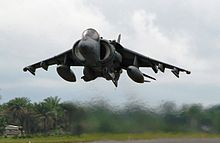 An AV-8B of the 398th Air Expeditionary Group taking off in Sierra Leone as part of Joint Task Force Liberia in 2006.
An AV-8B of the 398th Air Expeditionary Group taking off in Sierra Leone as part of Joint Task Force Liberia in 2006.
The AV-8B saw extensive action in the Gulf War of 1990–91. Aircraft based on USS Nassau and USS Tarawa, and at on-shore bases, flew training and support sorties, as well as practicing with coalition forces. The AV-8Bs were to be held in reserve during the initial phase of the preparatory air assault of Operation Desert Storm. On the morning of 17 January 1991, a call for air support from an OV-10 Bronco forward air controller against artillery that was shelling Khafji and an adjacent oil refinery, initiated the AV-8B into combat.[75] The following day, USMC AV-8Bs attacked Iraqi positions in southern Kuwait. Throughout the war, AV-8Bs worked in concert with coalition forces to destroy targets, as well as performing armed reconnaissance.[75] During Operations Desert Shield and Desert Storm, the AV-8B amassed 3,380 flights and 4,083 flight hours,[76] with a mission availability rate of over 90%.[77] Five AV-8Bs were lost to enemy surface-to-air missiles, and two Marine pilots were killed. The AV-8B had an attrition rate of 1.5 aircraft for every 1,000 sorties flown. Following the war, US Army General Norman Schwarzkopf named the AV-8B among the seven weapons—along with the F-117 Nighthawk and AH-64 Apache—which played a crucial role during the war.[78][79] In the aftermath of the war, from 27 August 1992 until 2003, USMC AV-8Bs and other aircraft patrolled the sky over Iraq in support of Operation Southern Watch. The AV-8Bs launched from amphibious assault ships in the Arabian Gulf, and from forward operating bases such as Ali Al Salem Air Base.[80]
The AV-8B again participated in a major conflict in the 1999, during NATO's bombing of Yugoslavia in Operation Allied Force. Twelve Harriers were split evenly between the 24th and 26th Marine Expeditionary Units (MEU). AV-8Bs of the 24th MEU were introduced into combat on 14 April, and over the next 14 days flew 34 combat air support missions over Kosovo. During their six-month deployment onboard USS Nassau, 24th MEU Harriers averaged a high mission-capable rate of 91.8%.[81] On 28 April, the 24th MEU was relieved by the 26th MEU, based on USS Kearsarge. The first combat sorties of the unit's AV-8Bs occurred two days later, with one aircraft lost. The 26th MEU remained in the theater of operations until 28 May, when it was relocated to Brindisi, Italy.[81]
USMC Harrier IIs participated in Operation Enduring Freedom (OEF) in Afghanistan from 2001. The USMC 15th MEU arrived off the coast of Pakistan in October 2001. Operating from the unit's ships, four AV-8Bs began attack missions into Afghanistan on 3 November 2001. The 26th MEU and its AV-8Bs joined 15th MEU later that month. In December 2001, Harrier IIs began moving into Afghanistan to a forward base at Kandahar. More AV-8Bs were deployed with other USMC units to the region in 2002. The VMA-513 squadron deployed six Night Attack Harrier IIs to Bagram in October 2002. These aircraft each carried a LITENING targeting pod. With the pod they performed reconnaissance missions along with attack and other missions primarily at night.[82] On 2 October 2010, an AV-8B Harrier II landed aboard USS Peleliu, marking the end of USMC Harrier involvement in the CAS mission in OEF.[83]
 A USMC AV-8B hovers as many more are parked on the deck of amphibious assault ship USS Bataan, one month after the start of Operation Iraqi Freedom.
A USMC AV-8B hovers as many more are parked on the deck of amphibious assault ship USS Bataan, one month after the start of Operation Iraqi Freedom.
The aircraft also saw service during the Iraq War in 2003, acting primarily in support of USMC ground units. During the initial action, 60 AV-8Bs were deployed on ships such as the USS Bonhomme Richard and USS Bataan; over a thousand sorties were flown from the sea. When possible, land-based forward arming and refuelling points were set up to enable prompt operations.[84] USMC commander Lieutenant General Earl B. Hailston said that the Harriers were able to provide 24-hour support for ground forces, and noted that "The airplane... became the envy of pilots even from my background... there's an awful lot of things on the Harrier that I've found the Hornet pilots asking me [for]... We couldn't have asked for a better record".[84] Major General James F. Amos later commented on the AV-8B's performance in Iraq, stating: "I simply could not have been more pleased with the reliability of the airplane and its weapons systems... and in the courage and discipline of my AV8 pilots."[85]
Marine Corps sources documented the Harrier as holding an 85% aircraft availability record in the Iraq War, and in just under a month of combat, the aircraft had flown over 2,000 sorties. When used, the LITENING II targeting pod achieved greater than 75% kill effectiveness on targets.[84] In a single sortie from USS Bonhomme Richard, a wave of Harriers inflicted heavy damage on a Republican Guard tank battalion in advance of a major ground assault on Al Kut.[86] Harriers regularly operated in close support roles for friendly tanks, usually with one carrying a LITENING pod. Despite the Harrier's high marks, the limited amount of time that each aircraft could remain on station, around 15–20 minutes, led to some calls from within the USMC for AC-130 gunships to be procured; the AC-130 could loiter for six hours, and had a heavier close air support capability than the AV-8B.[87] AV-8Bs were later used in combination with artillery to provide constant fire support for ground forces during heavy fighting in 2004 around the insurgent stronghold of Fallujah. The urban environment there required extreme precision for airstrikes.[88]
 Four AV-8Bs flying in formation over San Diego Bay as part of the Centennial of Naval Aviation celebration in 2011.
Four AV-8Bs flying in formation over San Diego Bay as part of the Centennial of Naval Aviation celebration in 2011.
On 20 March 2011, USMC AV-8Bs were launched from USS Kearsarge in support of Operation Odyssey Dawn, enforcing the UN no-fly zone over Libya.[89] They carried out air strikes on Sirte on 5 April 2011.[90] Multiple AV-8Bs were involved in the defense of a downed F-15E pilot, attacking approaching Libyans prior to the pilot's extraction by MV-22 Osprey.[91]
During its service life with the USMC, the Harrier has had an accident rate three times that of the Corps' other aircraft, the F/A-18 Hornet. The AV-8 was dubbed a widow maker by some in the military.[78][92] The Los Angeles Times reported in 2003 that the Harrier "...has amassed the highest major accident rate of any military plane now in service. Forty-five Marines have died in 148 noncombat accidents".[93] Aviation author Lon Nordeen notes that several other USMC single-engine strike aircraft, like the Douglas A-4 Skyhawk and LTV A-7 Corsair II, had worse accident rates.[94] The Harrier's high accident rate is largely due to the higher percentage of time it spends taking off and landing, which are the most critical times in flight.[95] The AV-8B is to be replaced by the F-35B version of the Lockheed Martin F-35 Lightning II, which had been slated to enter service in 2012.[96] The Marine Corps has argued strongly in favor of the development of the F-35B, considering the Harrier's performance in Iraq, including its ability to use forward operating bases, to have reinforced the need for a V/STOL aircraft in the USMC arsenal.[86]
Spain, already using the AV-8S Matador, became the first international operator of the AV-8B by signing an order for 12 aircraft in March 1983.[97] Designated VA-2 Matadors II by the Arma Aérea de la Armada (Spanish Navy), this variant is known as "EAV-8B" by McDonnell Douglas.[98] Pilot conversion took place in the US. On 6 October 1987, the first three Matador IIs were delivered to Naval Station Rota.[98] The new aircraft were painted in a two-tone matt grey finish, similar to US Navy aircraft, and deliveries were complete by 1988.[98]
BAe test pilots cleared the aircraft carrier Príncipe de Asturias for Harrier operations in July 1989. The carrier, which replaces the World War II-era Dédalo, has a 12° ski-jump ramp.[97][98] It was originally planned that the first unit to operate the aircraft would be the 8a Escuadrilla. However, this unit was disbanded on 24 October 1986 following the sales of AV-8S Matadors to Thailand.[98] Instead, 9a Escuadrilla was formed on 29 September 1987 to become part of the Alpha Carrier Air Group and operate the EAV-8B.[98]
In March 1993, under the September 1990 Tripartite MoU between the US, Italy and Spain, eight EAV-8B Plus Matadors were ordered, along with a twin-seat TAV-8B.[97][98] Deliveries for the "Plus"-standard aircraft started in 1996.[97] On 11 May 2000, Boeing and the Naval Air Systems Command finalized a contract which would see the company remanufacture Spanish EAV-8Bs to bring them up to Plus standard. Boeing said the deal required it to remanufacture two EAV-8Bs, with an option for another seven aircraft;[99] other sources say the total figure was eleven aircraft.[97] The remanufacture would allow the aircraft to carry four AIM-120 AMRAAMs, enhance the pilot's situational awareness through the installation of new radars and avionics, and provide a new engine.[97][99] Eventually, five aircraft were modified, with the last delivered on 5 December 2003.[100]
Spanish EAV-8Bs participated in Operation Deny Flight, enforcing the UN's no-fly zone over Bosnia and Herzegovina.[97] Spain did not send its aircraft carrier to participate in the Iraq War in 2003, instead deploying F/A-18s and other support aircraft.[101] In 2007, Spain conducted a contractual study into a replacement for the Harrier II, the likely option being the F-35B.[102] According to a Lockheed Martin vice-president, Spain was still evaluating the F-35B as of 2010.[103]
In the late 1960s, following a demonstration of the Hawker Siddeley Harrier on the Marina Militare (Italian Navy) helicopter carrier Andrea Doria, the country began investigating the possibility of acquiring the Harrier.[104] Early efforts were hindered by a 1937 Italian law, which forbade the navy from operating fixed-wing aircraft because they were the domain of the air force. In early 1989 the law was changed to allow the navy to operate any aircraft with a maximum weight of over 3,300 lb (1,500 kg).[105][106] Following a lengthy evaluation of the Sea Harrier and AV-8B, an order was placed for two TAV-8Bs in May 1989. Soon a contract for a further sixteen AV-8B Plus aircraft was signed.[106] Except for the TAV-8Bs and the first three AV-8Bs, all subsequent Italian Navy Harriers would be locally assembled by Alenia Aeronautica from kits delivered from the US.[107] The twin-seaters, the first to be delivered, arrived at Grottaglie in August 1991. They were used for proving flights with the Navy's helicopter carriers and on the light aircraft carrier Giuseppe Garibaldi.[104][108]
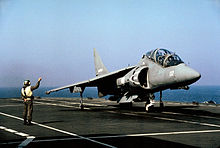 A Marina Militare TAV-8B Harrier II aboard the Giuseppe Garibaldi
A Marina Militare TAV-8B Harrier II aboard the Giuseppe Garibaldi
Deliveries of the initial US-built aircraft began in early 1994 to MCAS Cherry Point for pilot conversion training. In 1995 the first Italian-assembled Harrier was rolled out.[107] In mid-January of the same year, the Giuseppe Garibaldi set off from Taranto to Somalia, with three Harriers on board, to maintain stability following the withdrawal of UN forces.[109] The Harriers, flown by five Italian pilots, accumulated more than 100 flight hours and achieved 100% availability during the three-month deployment, flying reconnaissance missions and other roles. The squadron returned to port on 22 March.[104][107][110]
In 2000, the Italian Navy was looking to acquire a further seven remanufactured aircraft to equip the Giuseppe Garibaldi and a new carrier, the Cavour. Existing aircraft, meanwhile, were updated to allow them to carry AIM-120 AMRAAMs and JDAM precision-guided bombs.[107][111] Italian Harriers, operating from the Garibaldi, worked alongside Italian Eurofighters and the aircraft of other nations in the multinational 2011 military intervention in Libya for Operation Unified Protector.[112] Harriers conducted intelligence and reconnaissance operations over Libya, using the Litening targeting pods while armed with AIM-120 AMRAAMs and AIM-9 Sidewinders.[112] Marina Militare AV-8Bs are slated to be replaced by 22 F-35B versions of the F-35 Lightning II, operating from the Cavour.[113]
Variants
- YAV-8B
- Two prototypes converted in 1978 from existing AV-8A airframes (BuNo 158394, 158395).[19]
- AV-8B Harrier II
- This was the initial "Day Attack" variant. Four full-scale development (FSD) aircraft were completed in 1982, and manufacture of 166 production aircraft followed from 1983 to 1989. Most of these were upgraded to one of the following two variants, and the remainder were withdrawn from service.[114]
- AV-8B Harrier II Night Attack
- Improved version with a forward-looking infrared (FLIR) camera, an upgraded cockpit with night-vision goggle compatibility, and the more powerful Rolls Royce Pegasus 11 engine. One prototype was converted from AV-8B (BuNo 163853), and 66 new aircraft were completed from 1989 to 1993.[115] This variant was originally planned to be designated AV-8D.[116]
- AV-8B Harrier II Plus
- Similar to the Night Attack variant, with the addition of an APG-65 radar. It is used by the USMC, Spanish Navy, and Italian Navy. 46 new-built aircraft were assembled from 1993 to 1997. 72 were converted from existing AV-8Bs and received new BuNos.[117]
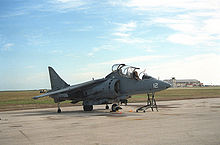 A USMC TAV-8B Harrier II at MacDill Air Force Base, Florida
A USMC TAV-8B Harrier II at MacDill Air Force Base, Florida
- EAV-8B Matador II
- Company designation for the Spanish Navy version. 12 were built.[117]
- EAV-8B Matador II Plus
- This version of the AV-8B Harrier II Plus was ordered for the Spanish Navy. 11 were converted from EAV-8Bs, and 9 new-built aircraft were completed.[117]
- Harrier GR5, GR7, GR9
- See British Aerospace Harrier II.
Operators
- The Italian Navy had 14 AV-8B Plus and 2 TAV-8B Harrier IIs in service as of December 2010.[118]
- Gruppo Aerei Imbarcati—"The Wolves"
- The Spanish Navy had 16 EAV-8B Plus and 1 TAV-8B aircraft operational as of December 2010.[118]
- 09th Squadron
- USA
- The United States Marine Corps has 126 AV-8B Plus and 16 TAV-8B Harrier IIs in operation as of December 2010.[118]
Specifications (AV-8B Harrier II Plus)
 External images
External imagesArmament and vectored nozzles 
Underside of AV-8 Harrier II Data from Nordeen,[119] Boeing[120]
General characteristics
- Crew: 1 pilot
- Length: 46 ft 4 in (14.12 m)
- Wingspan: 30 ft 4 in (9.25 m)
- Height: 11 ft 8 in (3.55 m)
- Wing area: 243.4 ft² (22.61 m²)
- Airfoil: supercritical airfoil
- Empty weight: 13,968 lb (6,340 kg)
- Loaded weight: 22,950 lb (10,410 kg)
- Max takeoff weight:
- Rolling: 31,000 lb (14,100 kg)
- Vertical: 20,755 lb (9,415 kg)
- Powerplant: 1 × Rolls-Royce F402-RR-408 (Mk 107) vectored-thrust turbofan, 23,500 lbf (105 kN)
Performance
- Maximum speed: Mach 1.0 (585 knots, 673 mph, 1,083 km/h)
- Range: 1,200 nmi (1,400 mi, 2,200 km)
- Combat radius: 300 nmi (350 mi, 556 km)
- Ferry range: 1,800 nmi (2,100 mi, 3,300 km)
- Rate of climb: 14,700 ft/min (4,485 m/min)
- Wing loading: 94.29 lb/ft² (460.4 kg/m²)
Armament
- Guns: 1× General Dynamics GAU-12 Equalizer 25 mm (0.984 in) 5-barreled gatling cannon mounted under-fuselage in the left pod, with 300 rounds of ammunition in the right pod
- Hardpoints: 6× under-wing pylon stations holding up to 13,200 lb (5,988 kg) of payload:
- Rockets:
- 4× LAU-5003 rocket pods (each with 19× CRV7 70 mm rockets)
- Missiles:
- Air-to-air missiles:
- 4× AIM-9 Sidewinder or similar-sized infrared-guided missiles
- 6× AIM-120 AMRAAM (on radar equipped AV-8B Plus variants)
- Air-to-surface missiles:
- 6× AGM-65 Maverick; or
- 2× AGM-84 Harpoon; or
- 2× AGM-88 HARM
- Air-to-air missiles:
- Bombs:
- CBU-100 cluster bombs (CBUs)
- Mark 80 series of unguided bombs (including 3 kg and 14 kg practice bombs)
- Paveway series of laser-guided bombs (LGBs)
- Mark 77 napalm canisters
- Others:
- up to 4× 300/330/370 US Gallon drop tanks (pylon stations No. 2, 3, 4 & 5 are wet plumbed)
- Intrepid Tiger II electronic jammer.[121]
Avionics
- Raytheon APG-65 radar
- AN/AAQ-28V LITENING targeting pod (on radar-equipped AV-8B Plus variants)
- Special note: An upgrade program is currently fitting airframes with wiring and software to employ MIL-STD-1760 bus-based smart weapons, such as Joint Direct Attack Munitions
Popular culture
Main article: Aircraft in fiction#Harrier familyThe Harrier's unique characteristics have led to it being featured in a number of films and video games. Two AV-8Bs were used in the 1994 film True Lies, including one flown by Arnold Schwarzenegger's character.[122]
As part of its 1996 Pepsi Stuff marketing campaign, Pepsi ran an advertisement promising a Harrier jet to anyone who collected 7,000,000 Pepsi Points, a gag that backfired when a participant attempted to take advantage of the ability to buy additional points for 10 cents each to claim a jet for $700,000. When Pepsi turned him down, a lawsuit ensued, in which the judge ruled that any reasonable person would conclude that the advertisement was a joke.[123]
See also
- Related development
- Harrier Jump Jet
- British Aerospace Sea Harrier
- British Aerospace Harrier II
- Aircraft of comparable role, configuration and era
- Boeing X-32
- Lockheed Martin F-35 Lightning II
- Yakovlev Yak-141
- Related lists
- List of Harrier Jump Jet family losses
- List of active United States military aircraft
References
- Notes
- Citations
- ^ Nordeen 2006, p. 49.
- ^ a b c d e Wilson 2000, p. 29.
- ^ a b Nordeen 2006, p. 61.
- ^ Nordeen 2006, Appendix A.
- ^ Moxon, Julian (23 May 1987). "AV-8B hits trouble". Flight International: 11. http://www.flightglobal.com/pdfarchive/view/1987/1987%20-%200501.html. Retrieved 6 July 2011.
- ^ a b c Lopez, Ramon (20–26 March 1996). "USMC told to scrap its AV-8B upgrade plans". Flight International: 19. http://www.flightglobal.com/pdfarchive/view/1996/1996%20-%200639.html. Retrieved 22 July 2011.
- ^ a b c d e f Wilson 2000, p. 26.
- ^ Jenkins 1998, pp. 69–70.
- ^ a b Nordeen 2006, p. 41.
- ^ Eden 2004, p. 292.
- ^ Eden 2004, p. 288.
- ^ Jackson 1987, p. 138.
- ^ Jenkins 1998, pp. 70–72.
- ^ Nordeen 2006, pp. 42–44, 48–49.
- ^ Lehman 2001, p. 157.
- ^ Nordeen 2006, p. 52.
- ^ Gaines, Mike (1 June 1985). "AV-8B—mean Marine V/Stol machine". Flight International: 148. http://www.flightglobal.com/pdfarchive/view/1985/1985%20-%201756.html. Retrieved 6 July 2011.
- ^ Nordeen 2006, pp. 41–42.
- ^ a b c d Wilson 2000, p. 28.
- ^ Nordeen 2006, pp. 42–44, 48–49.
- ^ Nordeen 2006, pp. 48–49.
- ^ Nordeen 2006, p. 59.
- ^ Jenkins 1998, p. 76.
- ^ a b c Jenkins 1998, pp. 76–77.
- ^ a b c d e f Wilson 2000, p. 39.
- ^ a b Nordeen 2006, p. 60.
- ^ Grove 1990, pp. 141–142.
- ^ a b Nordeen 2006, p. 92.
- ^ Nordeen 2006, pp. 98–99.
- ^ a b Nordeen 2006, p. 99.
- ^ Wilson 2000, pp. 30–31.
- ^ a b c Nordeen 2006, p. 100.
- ^ Nordeen 2006, p. 101.
- ^ Wilson 2000, p. 31.
- ^ a b c Nordeen 2006, p. 103.
- ^ a b Lopez, Ramon (19–25 May 1993). "US Marines to target 70 AV-8Bs for upgrade". Flight International: 17. http://www.flightglobal.com/pdfarchive/view/1993/1993%20-%201156.html. Retrieved 22 July 2011.
- ^ "Harrier Projects". Airforce-technology.com. http://www.airforce-technology.com/projects/harrier/. Retrieved 5 July 2011.
- ^ Doyle, Andrew (21–27 August 2001). "Taiwan's STOVL need could extend Harrier production". Flight International: 26. http://www.flightglobal.com/pdfarchive/view/2001/2001%20-%202862.html. Retrieved 18 July 2011.
- ^ Govindasamy, Siva (11 July 2007). "Taiwan eyes Apaches for army requirement". Flight International. http://www.flightglobal.com/news/articles/taiwan-eyes-apaches-for-army-requirement-215464/. Retrieved 21 October 2011.
- ^ Chen, Edward (5 Octover 2011). "China's big mouth may have helped Taiwan out". The Taipei Times. http://www.taipeitimes.com/News/editorials/archives/2011/10/05/2003514939. Retrieved 21 October 2011.
- ^ Jenkins 1998, pp. 69–74.
- ^ "How the Harrier hovers". Harrier.org.uk. http://www.harrier.org.uk/technical/How_Hovers.htm. Retrieved 17 April 2010.
- ^ Taylor 1988, pp. 290–291.
- ^ Lambert 1993, p. 166.
- ^ "Standard Aircraft Charateristics: Navy Model AV-8B Harrier II Aircraft" (PDF). US Navy. August 1985. p. 16. http://www.history.navy.mil/planes/av-8b.pdf. Retrieved 5 August 2011.
- ^ Jenkins 1998, pp. 88–89.
- ^ a b Warwick, Graham (29 December 1979). "AV-8B Advanced Harrier". Flight International: 2127–2142. http://www.flightglobal.com/pdfarchive/view/1979/1979%20-%204705.html. Retrieved 22 July 2011.
- ^ a b Wilson 2000, pp. 26–27.
- ^ Eden 2004, p. 289.
- ^ Walker 1986, pp. 24–25.
- ^ a b Walker 1986, pp. 23–25.
- ^ a b Wilson 2000, p. 27.
- ^ Walker 1986, p. 25.
- ^ a b Walker 1986, p. 24.
- ^ Nordeen 2006, pp. 119–120.
- ^ Ashley 1988, p. 59.
- ^ Evans 1998, p. 92.
- ^ Spick 2000, pp. 402–409.
- ^ Adams, Charlotte (14 December 1997). "Voice-recognition technology: Waiting to exhale". Federal Computer Week. http://fcw.com/articles/1997/12/14/voicerecognition-technology-waiting-to-exhale.aspx. Retrieved 19 July 2011.
- ^ "Navy Model: AV-8B Harrier II Aircraft" (PDF). Naval Air Systems Command. October 1986. p. 3. http://www.history.navy.mil/planes/av-8b.pdf. Retrieved 18 July 2011.
- ^ Jenkins 1998, p. 76–77.
- ^ Nordeen 2006, p. 88.
- ^ Elliot, Simon (12–18 September 1990). "Harrier: The Next 30 Years". Flight International. http://www.flightglobal.com/pdfarchive/view/1990/1990%20-%202780.html. Retrieved 22 July 2011.
- ^ Nordeen 2006, pp. 92–93.
- ^ Donald and March 2004, p. 89.
- ^ Wilson 2000, pp. 29–30.
- ^ "Harrier II Plus (AV-8B) VSTOL Fighter and Attack Aircraft, USA". Airforce-technology.com. http://www.airforce-technology.com/projects/harrier/. Retrieved 18 July 2011.
- ^ Wilson 2000, p. 30.
- ^ Nordeen 2006, p. 97.
- ^ Nordeen 2006, pp. 100–101.
- ^ a b Nordeen 2006, p. 57.
- ^ Nordeen 2006, p 58.
- ^ Nordeen 2006, pp. 36, 61.
- ^ Polmar 2005, p. 400.
- ^ a b Nordeen 2006, p. 81.
- ^ Nordeen 2006, p. 87.
- ^ "AV-8B Harrier". Federation of American Scientists. http://www.fas.org/programs/ssp/man/uswpns/air/attack/av8b_harrier.html. Retrieved 18 July 2011.
- ^ a b Miller, Alan C; Sack, Kevin (15 December 2002). "Far From Battlefield, Marines Lose One-Third of Harrier Fleet". Los Angeles Times. http://www.pulitzer.org/archives/6722. Retrieved 21 July 2011.
- ^ Wilson 2000, p. 43.
- ^ Nordeen 2006, pp 127–128.
- ^ a b Nordeeen 2006, p. 111.
- ^ Nordeen 2006, pp. 144–51.
- ^ "USS Peleliu (LHA 5) Operation Enduring Freedom". US Navy. http://www.public.navy.mil/surfor/lha5/Pages/OperationEnduringFreedom.aspx#.TpHwl0isAZE. Retrieved 9 October 2011.
- ^ a b c Cordesman 2003, p. 333.
- ^ "AV-8B Harrier finding Success in Iraq". Defense Industry Daily. 30 March 2005. http://www.defenseindustrydaily.com/av8b-harrier-finding-success-in-iraq-0256. Retrieved 20 July 2011.
- ^ a b Cordesman 2003, p. 334.
- ^ Cordesman 2003, pp. 334–335.
- ^ Nordeen 2006, p. 142.
- ^ "Navy, Marine Corps Aircraft Strike Libya" (Press release). US Navy. 20 March 2011. http://www.navy.mil/search/display.asp?story_id=59195. Retrieved 19 July 2011.
- ^ "US planes launch assault on Libyan cities". Associated Press. News.com.au. 5 April 2011. http://www.news.com.au/breaking-news/us-planes-launch-assault-on-libyan-cities/story-e6frfku0-1226033755494. Retrieved 19 July 2011.
- ^ Lamothe, Dan (16 July 2011). "Marine pilots recount daring rescue mission". Marinecorpstimes.com. http://www.marinecorpstimes.com/news/2011/07/marine-pilots-recount-daring-rescue-mission-071611/. Retrieved 19 July 2011.
- ^ "'Nightmare's Prayer': A Jet Fighter's Missions". NPR public radio network. 24 October 2010. http://www.npr.org/templates/story/story.php?storyId=130788392. Retrieved 28 October 2010.
- ^ Miller, Alan C; Sack, Kevin (11 December 2003). "Harrier Crash Renews Calls for an Inquiry". Los Angeles Times. http://articles.latimes.com/2003/dec/11/nation/na-harrier11.
- ^ Nordeen 2006, p. 155.
- ^ Jenkins 1998, p. 4.
- ^ Eden 2004, p. 274.
- ^ a b c d e f g Wilson 2000, p. 46.
- ^ a b c d e f g Eden 2004, p. 294.
- ^ a b "Boeing to Produce Remanufactured Harriers for Spanish Navy" (Press release). Boeing. 11 May 2000. http://www.boeing.com/defense-space/military/av8b/news/2000/news_release_000511n.htm. Retrieved 6 July 2011.
- ^ "Nations Pursue Joint Program Office to Manage Global Boeing Harrier II Fleet" (Press release). Boeing. 5 December 2003. http://www.boeing.com/defense-space/military/av8b/news/2003/q4/nr_031205m.html. Retrieved 2 August 2011.
- ^ Goodman, Al (18 March 2003). "Spain: No combat role in Iraq war". CNN. http://articles.cnn.com/2003-03-18/world/sprj.irq.spain_1_spanish-troops-minister-jose-maria-aznar-combat-troops?_s=PM:WORLD. Retrieved 20 July 2011.
- ^ Wolf, Jim (27 February 2009). "Lockheed says interest growing in F-35 fighter". Reuters. http://uk.reuters.com/article/2009/02/27/fighter-lockheed-buyers-idUKN2735708720090227. Retrieved 20 July 2011.
- ^ Hoyle, Craig (20 July 2010). "FARNBOROUGH: Face the Facts with Steve O'Bryan". Flight International. http://www.flightglobal.com/news/articles/farnborough-face-the-facts-with-steve-obryan-344745/. Retrieved 31 October 2011.
- ^ a b c Eden 2004, p. 295.
- ^ Geisenheyner, Stefan (9 August 1986). "Harriers for the Garibaldi?". Flight International. http://www.flightglobal.com/pdfarchive/view/1986/1986%20-%201900.html. Retrieved 6 July 2011.
- ^ a b Wilson 2000, p. 44.
- ^ a b c d Wilson 2000, p. 45.
- ^ "Naval Air Revolution". Flight International. 18–24 March 1992. http://www.flightglobal.com/pdfarchive/view/1992/1992%20-%200661.html. Retrieved 6 July 2011.
- ^ Spinelli, Andrea (25–31 January 1995). "Italy deploys Harrier II Plus for first time". Flight International. http://www.flightglobal.com/pdfarchive/view/1995/1995%20-%200436.html. Retrieved 6 July 2011.
- ^ Nordeen 2006, p. 102.
- ^ Nativi, Andy (12–18 September 2000). "Italy navy eyes aircraft options". Flight International. http://www.flightglobal.com/news/articles/italy-navy-eyes-aircraft-options-120147/. Retrieved 31 October 2011.
- ^ a b Peruzzi, Luca (31 March 2011). "Libya: Italian Eurofighters, Harriers fly first combat air patrol missions". Flight International. http://www.flightglobal.com/news/articles/libya-italian-eurofighters-harriers-fly-first-combat-air-patrol-354948/. Retrieved 31 October 2011.
- ^ Nativi, Andy (1 April 2010). "Italy Pressuring U.S., Lockheed Over JSF Work". Aviation Week. http://www.aviationweek.com/aw/generic/story_generic.jsp?channel=aerospacedaily&id=news/asd/2010/04/01/01.xml. Retrieved 5 August 2011.
- ^ Nordeen 2006, pp. 94, 156, Appendix C.
- ^ Nordeen 2006, pp. 92–94, 103.
- ^ Jenkins 1998, p. 81.
- ^ a b c d Wilson 2000, p. 48.
- ^ a b c "Directory: World Air Forces". Flight International, 14–20 December 2010. pp. 19, 25, 29.
- ^ Nordeen 2006, Appendix C.
- ^ "AV-8B Harrier II Plus". Boeing. http://www.boeing.com/defense-space/military/av8b/av8bspec.htm. Retrieved 6 July 2011.
- ^ "USMC Harriers, Hornets and Hueys May Do EW". Defensetech.org. Retrieved 13 October 2011.
- ^ Kemper, Bob (8 September 1996). "The Military And the Movies". Daily Press. p. 2. http://articles.dailypress.com/1996-09-08/features/9609060045_1_pentagon-fighter-recruitment/2. Retrieved 11 January 2010.
- ^ Epstein 2006, p. 55.
- Bibliography
- Ashley, Stephen (October 1988). "Jump Jet". Popular Science 233 (4): 56–59, 112, 114. http://books.google.co.uk/books?id=JAZt49uUiuIC&pg=PA56&lpg=PA56&dq=&source=bl&ots=OH3hhJ1PcM&sig=sk1sxJxDVC5GQHQJJU3H_975pmk&hl=en&ei=ndzLTfjIJsGHhQfz3IipAg&sa=X&oi=book_result&ct=result&resnum=9&ved=0CEwQ6AEwCA#v=onepage.
- Cordesman, Anthony H. (2003). The Iraq War: strategy, tactics, and military lessons. Washington, D.C.: Centre for Strategic and International Studies. ISBN 0-89206-432-3. http://books.google.com/books?id=7cU8Kpzu9osC&printsec=frontcover&dq=The+Iraq+War:+strategy,+tactics,+and+military+lessons.&hl=en&ei=bbQ8TqOZMc74mAWHhYnwBw&sa=X&oi=book_result&ct=book-preview-link&resnum=1&ved=0CCsQuwUwAA#v=onepage&q&f=false.
- Donald, David; March, Daniel J., eds (2004). "Boeing/BAE systems AV-8B Harrier II". Modern Battlefield Warplanes. Norwalk, Connecticut: AIRtime Publishing. ISBN 1-880588-76-5.
- Eden, Paul, ed (2004). The Encyclopedia of Modern Military Aircraft. London, UK: Amber Books. ISBN 1-904687-84-9.
- Epstein, David G. (2006). Making and Doing Deals: Contracts in Context (second edition). Newark, New Jersey: LexisNexis. ISBN 0-8205-7044-3.
- Evans, Andy (1998). BAE / McDonnell Douglas Harrier. Ramsbury, UK: The Crowood Press. ISBN 1-86126-105-5.
- Grove, Eric (1990). The Future of Sea Power. London, UK: Routledge. ISBN 0-4150-0482-9. http://books.google.com/books?id=qM4OAAAAQAAJ&printsec=frontcover&dq=The+Future+of+Sea+Power&hl=en&ei=u7Q8Tp21CuKdmQX4teH3Bw&sa=X&oi=book_result&ct=result&resnum=1&ved=0CCgQ6AEwAA#v=onepage&q&f=false.
- Jackson, Robert (1987). NATO air power. Shrewsbury, UK: Airlife Publishing. ISBN 0-9063-9380-9.
- Jenkins, Dennis R. (1998). Boeing / BAe Harrier. Warbird Tech. 21. North Branch, Minnesota: Specialty Press. ISBN 1-58007-014-0.
- Lambert, Mark (1993). Jane's All The World's Aircraft 1993–94. Coulsdon, UK: Jane's Information Group. ISBN 0-7106-1066-1.
- Lehman, John F. (2001). Command of the Seas. Annapolis, Maryland: Naval Institute Press. ISBN 1-5575-0534-9. http://books.google.com/books?id=VDy6Ub4B5fkC&printsec=frontcover&dq=Command+of+the+Seas&hl=en&ei=hLU8TuaFMMPEmAWDo9yCCA&sa=X&oi=book_result&ct=book-preview-link&resnum=1&ved=0CCsQuwUwAA#v=onepage&q&f=false.
- Nordeen, Lon O. (2006). Harrier II, Validating V/STOL. Annapolis, Maryland: Naval Institute Press. ISBN 1-59114-536-8. http://books.google.com/books?id=m9aQXZ5rsLYC&printsec=frontcover&dq=Harrier&hl=en&ei=c3kmTs6_LdHTmAXPp-HIBQ&sa=X&oi=book_result&ct=book-preview-link&resnum=1&ved=0CC8QuwUwAA#v=onepage&q&f=false.
- Polmar, Norman (2005). The Naval Institute guide to the ships and aircraft of the U.S. fleet. Annapolis, Maryland: Naval Institute Press. ISBN 1-59114-685-2. http://books.google.com.au/books?id=8MwyTX-iA2wC&printsec=frontcover#v=onepage&q&f=false.
- Spick, Mike (general editor) (2000). Great Book of Modern Warplanes. Osceola, Minnesota: MBI Publishing. ISBN 0-7603-0893-4.
- Taylor, John W. R. (1988). Jane's All The World's Aircraft 1988–89. Coulsdon, UK: Jane's Defence Data. ISBN 0-7106-0867-5.
- Walker, Karen (19 July 1986). "V/STOL Comes of Age". Flight International: 23–25. http://www.flightglobal.com/pdfarchive/view/1986/1986%20-%201660.html. Retrieved 22 July 2011.
- Wilson, Stewart (2000). BAe / McDonnell Douglas Harrier. Shrewsbury, UK: Airlife Publishing. ISBN 1-84037-218-4.
External links
- AV-8B Plus product page at Boeing.com
- AV-8B Harrier II fact sheet and AV-8B Harrier II history page at Navy.mil
- AV-8B Harrier page at Globalsecurity.org
- McDonnell Douglas/British Aerospace AV-8B Harrier II Attack Fighter page on Aerospaceweb.org
- RTP-TV AeroSpace Show: Video of Harrier Hovering
- 3D view of Harrier AV-8B at the National Museum of the Marines Corps site
McDonnell and McDonnell Douglas military aircraft and spacecraft Fighters USAAF/US Air ForceUS Navy/USMCExportLicensedAttack US Navy/USMCTrainers US NavyTransports US Air ForceUS NavyLicensedHelicopters US Army/US Air ForceUS NavyXHJH · XHCH · XHRH
ExportDrones (UAVs) US NavyKDH
Experimental US Army/US Air ForceXV-1 · X-36 · F-15 STOL/MTD · Bird of Prey
Spacecraft NASAUS Air ForceHarrier Jump Jet family and related aircraft Predecessors 1st Generation 2nd Generation United States tri-service attack aircraft designations post–1962 Main sequence Non-sequential designations V/STOL sequence AV-8A · AV-8BSee also: EA-18GUnited States tri-service STOL and VTOL aircraft designations post-1962 Lists relating to aviation General Aircraft (manufacturers) · Aircraft engines (manufacturers) · Airlines (defunct) · Airports · Civil authorities · Museums · Registration prefixes · Rotorcraft (manufacturers) · TimelineMilitary Accidents/incidents Records Categories:- Carrier-based aircraft
- Gulf War aircraft
- McDonnell Douglas aircraft
- United States attack aircraft 1970–1979
- VTOL aircraft
- Single-engined jets
Wikimedia Foundation. 2010.

